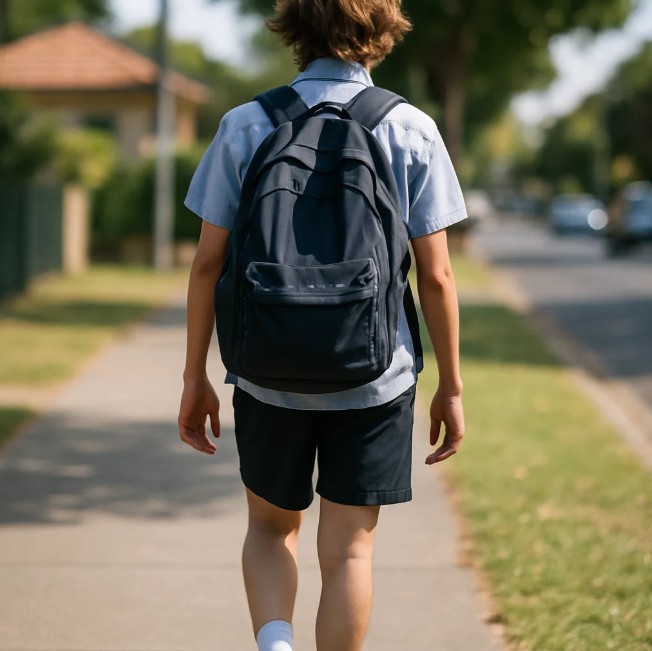
One in five NSW students experience at least one suspension or expulsion, alarming new research shows.
A longitudinal study, led by the Queensland University of Technology, raises concerns about the long-term impacts of exclusionary discipline and the need for alternative behavioural support.
In an Australian first, researchers tracked individual students’ disciplinary exclusions over time using population data from more than 71,000 NSW public school students. It found that by Year 12, almost 20% of students had experienced at least one suspension or expulsion, and two-thirds of those were excluded on multiple occasions.
Around one in 20 children were first suspended in primary school, with the rate accelerating sharply during the early years of high school.
First author Lauren Piltz from the QUT School of Psychology and Counselling said the study shows that exclusionary discipline is both common and cumulative.
“Most children who are suspended once are likely to be suspended again,” Piltz said. “For some students, exclusion becomes a pattern rather than a one-off consequence and it often begins very early.”
The most frequent reasons for suspension she said were “aggressive behaviour” and “continued disobedience”, while serious offences such as weapons or drug-related incidents were rare.
Disadvantaged students most impacted
The study found that boys, students from disadvantaged families and those living in regional and remote areas were significantly more likely to be excluded, and to be excluded repeatedly.
Alarmingly, children of unemployed parents were around 10 times more likely to experience 16 or more suspensions than their peers.
Corresponding-author Professor Kristin Laurens from the QUT School of Psychology and Counselling and QUT Centre for Inclusive Education said the findings show that suspensions do not solve problem behaviour and risk entrenching disadvantage.
“This research makes clear that exclusion is not an effective response,” Professor Laurens said. “It doesn’t improve behaviour, and it disproportionately affects the students who already face the greatest barriers.
Professor Laurens said a rethink is needed on how schools address behavioural issues, saying that encouraging good behaviour is a better long-term investment than simply removing kids from school.
“Instead of removing children from school, we need to focus on inclusive, evidence-based strategies that teach social, emotional and behavioural skills from the early years.”
Relational wins over reactional
Dr David Roy, a lecturer and researcher in Education and Creative Arts at the University of Newcastle, agrees that inclusive-based strategies are a more effective approach than suspension or expulsion.
“Effective management of student behaviour without resorting to suspensions or expulsions relies on proactive, relational, and restorative approaches,” Dr Roy told The Educator. “The most successful strategies focus on addressing the underlying causes of behaviour rather than simply punishing the outcomes.”
Dr Roy said building strong, respectful relationships between teachers and students is foundational.
“When students feel known, valued, and safe, they are more likely to engage positively in learning,” he said. “Clear, consistent expectations and collaborative classroom routines create predictability and reduce anxiety-driven behaviours.”
Dr Roy said restorative practices, such as restorative circles and mediated conversations, encourage accountability, empathy, and problem-solving.
“Instead of exclusion, students are guided to reflect on the impact of their actions and to repair harm done to others and the community,” he said.
“Positive Behaviour for Learning [PBL] frameworks further support this approach by explicitly teaching social and emotional skills, reinforcing desirable behaviours, and providing tiered supports for those with additional needs.”
Importantly, Dr Roy points out, schools that adopt a trauma-informed or culturally responsive lens are better equipped to understand behavioural expressions as communication rather than defiance.
“When educators work in partnership with families, counsellors, and community services, they can create inclusive environments that prioritise learning, belonging, and wellbeing—making exclusionary discipline largely unnecessary.”
‘Every suspension represents lost learning’
Professor Linda Graham, co-author from the QUT School of Education and Director of the QUT Centre for Inclusive Education agrees, saying early intervention and whole-school approaches to behaviour management are needed.
“Every suspension represents lost learning and lost connection with school,” Professor Graham said. “If we want to improve student engagement and wellbeing, keeping children connected to education has to be the goal.”
The study, ‘Students’ accumulation of disciplinary school exclusion experiences over time: Prevalence, patterns, and correlates in an Australian population cohort’, was conducted as part of the NSW Child Development Study with support from the Australian Research Council, National Health and Medical Research Council, and Department of Health and Aged Care Medical Research Future Fund.

